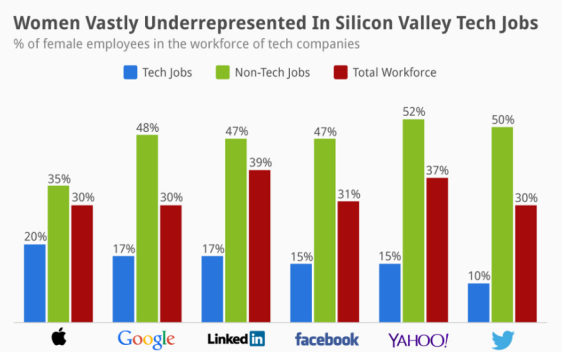Women in Tech: A Roundtable Round-Up
A resource roundup provided by Women’s Center student staff member, Sydney

Each month the Women’s Center hosts a roundtable discussion where we provide a few chosen panelists with guiding questions and then have a community discussion about a particular topic and how it intersects with women and gender. Roundtables are great opportunities to become involved in discourse and ask questions directly to those involved. On Thursday, September 15th The Women’s Center hosted our September roundtable, Women in Technology. In case you missed it or are interested in revisiting the topics, here is a summary of our discussion. At the end, we include some links to reading materials and additional resources.
We started off the session by discussing some relevant statistics regarding women college students who are pursuing STEM degrees and careers. Women earn 57.3% of all Bachelor’s degrees but only account for 17.9% of the degrees in Computer Science.

Source: careerfoundry.com
When it comes to the workforce, women make up a small percentage of the tech jobs. And even a smaller percentage of those in leadership positions!

Source: statista.com, 2014
And although women only make up a small percentage of tech jobs at these companies, women use these platforms more than men!

After addressing some of the statistics about the discrepancies surrounding women in STEM fields, we heard from our panel about their experiences in academia and the tech industry.
Dr. Danyelle Ireland who is the Associate Director of the Center for Women in Technology (CWIT) and Dr. Marie desJardins, the Associate Dean of College of Engineering and Information Technology here at UMBC, talked about why there is such a small number of women pursuing STEM. They set out to debunk the myth of a “lack of interest” surrounding technology for women and instead pointed out social factors that contribute to the low numbers. These included:
- A lack of awareness of jobs or role models
- The socialization that STEM is for men reaffirmed by video game and tech advertisements. Specifically, Dr. desJardins’ shared that when personal computers first began to be marketed to the general public in the 1980s, advertisements only focused on men as the would-be-users of this new technology.
- Bias and discrimination that women may face in the workforce.
- A hypercritical culture in which women constantly critique their own work.
- The introduction of AP computer science classes in high schools which women students did not think was their space and a discrepancy of life goals between men and women.
- The Innate Brilliance Model
- And performance perception in which women are much harsher on their own performance compared to men’s self-perception.
We then heard from our last panelist, Katie Dillon, who is a UMBC CWIT student majoring in computer science. Katie discussed the importance of seeing women in her classes and how, in her experience, CWIT has created a more women-friendly climate in her tech classes. She then talked about her experiences in the tech industry and the sexism she faces as a woman intern in the tech industry. These instances ranged from being mistaken for a secretary (and not the engineer she in fact was) to being told she only got her position only because she is a woman.
We ended our discussion with each panelist giving participants their advice on how to handle workplace sexism or discrimination. There were two common theme throughout the answers – making connections and knowing your limits. For women in tech it is important to surround yourself with allies, whether that be a mentor or fellow women employees, in order to have a soundboard if an issue was to arise. Knowing your reporting guidelines is also important (for example, “Can you report an instance of sexism anonymously at your workplace?”). The last piece of advice the panelists gave was to know what you stand for. Dr. Ireland made a point to tell the audience that it is not worth compromising yourself for a degree or a job and Dr. desJardins gave the advice that people respect when you are unapologetically yourself. Katie also made the great point that you are interviewing a company just as much as they are interviewing you – don’t be afraid to find out what they are willing to do for you!
Below are some resources surrounding Women in Tech:
- CWIT– CWIT has a variety of opportunities surrounding women in tech both academically and professionally. The CWIT affiliates program is a great resource as well.
- A conference for Women in Computing
For further reading:
- Sexism In Gaming
- #ilooklikeanengineer
- Why are there so few women in tech?
- Women Coders Are More Respected When Peers Don’t Know They’re Women
- Google Diversity Manifesto Reaction
Be sure to follow the Women’s Center on myUMBC to stay tuned for our next round table event in October!
Posted: September 19, 2017, 4:02 PM